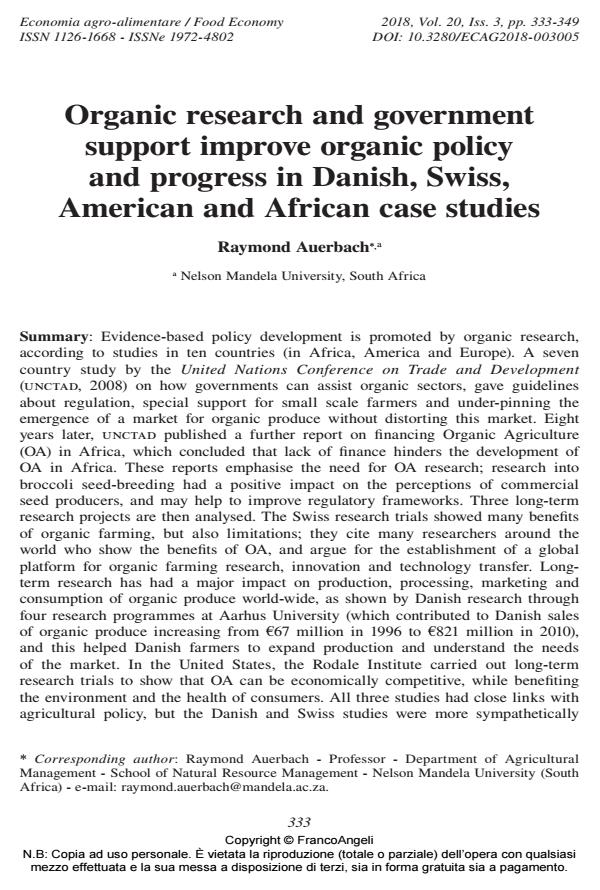Organic research and government support improve organic policy and progress in Danish, Swiss, American and African case studies
Journal title ECONOMIA AGRO-ALIMENTARE
Author/s Raymond Auerbach
Publishing Year 2019 Issue 2018/3
Language English Pages 17 P. 333-349 File size 139 KB
DOI 10.3280/ECAG2018-003005
DOI is like a bar code for intellectual property: to have more infomation
click here
Below, you can see the article first page
If you want to buy this article in PDF format, you can do it, following the instructions to buy download credits

FrancoAngeli is member of Publishers International Linking Association, Inc (PILA), a not-for-profit association which run the CrossRef service enabling links to and from online scholarly content.
Evidence-based policy development is promoted by organic research, according to studies in ten countries (in Africa, America and Europe). A seven country study by the United Nations Conference on Trade and Development (unctad, 2008) on how governments can assist organic sectors, gave guidelines about regulation, special support for small scale farmers and under-pinning the emergence of a market for organic produce without distorting this market. Eight years later, unctad published a further report on financing Organic Agriculture (OA) in Africa, which concluded that lack of finance hinders the development of OA in Africa. These reports emphasise the need for OA research; research into broccoli seed-breeding had a positive impact on the perceptions of commercial seed producers, and may help to improve regulatory frameworks. Three long-term research projects are then analysed. The Swiss research trials showed many benefits of organic farming, but also limitations; they cite many researchers around the world who show the benefits of OA, and argue for the establishment of a global platform for organic farming research, innovation and technology transfer. Longterm research has had a major impact on production, processing, marketing and consumption of organic produce world-wide, as shown by Danish research through four research programmes at Aarhus University (which contributed to Danish sales of organic produce increasing from €67 million in 1996 to €821 million in 2010), and this helped Danish farmers to expand production and understand the needs of the market. In the United States, the Rodale Institute carried out long-term research trials to show that OA can be economically competitive, while benefiting the environment and the health of consumers. All three studies had close links with agricultural policy, but the Danish and Swiss studies were more sympathetically received and resulted directly in positive changes to agricultural policies in those countries.
Keywords: Organic agriculture, policy, case studies, research, contribution.
Jel codes: Q15, Q18
- Andreasen, L., Rasmussen, I.A., & Halberg, N. (2015). Organic Research and Development in Denmark (1996-2010) - Effects on the Organic Sector and Society. Sustainable Agriculture Research, 4(3), 173-183.
- Auerbach, R. (Ed.) (Forthcoming, 2019). Organic Food Systems: Meeting the needs of Southern Africa. Wallingford, UK: Commonwealth Agricultural Bureau International.
- Board on Agriculture (1989). Alternative Agriculture: Study by the Committee on the Role of Alternative Farming Methods in Modern Production Agriculture. National Research Council, Academies Press.
- Hepperly, P., Douds, D., & Seidel, R. (2006). The Rodale Institute Farming Systems Trial 1981 to 2005: Long-term analysis of organic and conventional maize and soybean cropping systems. In Raupp, J., Pekrun, C., Oltmanns, M., & Kopke, U. (Eds.), Long-term Field Experiments in Organic Farming (pp. 15-31). Bonn: International Society of Organic Agriculture Research (isofar).
- iaastd (International Assessment of Agricultural knowledge systems, Science and Technology for Development) (2009). Agriculture at a Crossroads – Global Report. -- Available: www.fao.org/fileadmin/templates/est/Investment/Agriculture_at_a_Crossroads_Global_Report_iaastd.pdf. New York: Island Press.
- Mader, P., Flieβbach, A., Dubois, D., Gunst, L., Jossi, W., Widmer, F., Oberson, A., Frossard, E., Oehl, F., Wiemken, A., Gattinger, A., & Niggli, U. (2006). The dok experiment (Switzerland). In Raupp, J., Pekrun, C., Oltmanns, M., & Kopke, U. (Eds.), Long-term Field Experiments in Organic Farming (pp. 41-58). Bonn: International Society of Organic Agriculture Research (isofar).
- National Research Council (2010). Towards sustainable agricultural systems in the 21st century. Washington: The National Academies.
- Niggli, U., Andres, C., Willer, H., & Baker, B. (2017). Building a global platform for organic farming research, innovation and technology transfer. Organic Agriculture, 7(3), 1-16.
- Rasmussen, I., Askegaard, M., & Olesen, J. (2006). The Danish organic crop rotation experiment for cereal production 1997-2004. In Raupp, J., Pekrun, C., Oltmanns, M., & Kopke, U. (Eds.), Long-term Field Experiments in Organic Farming (pp. 117-134). Bonn: International Society of Organic Agriculture Research (isofar).
- Raupp, J., Pekrun, C., Oltmanns, M., & Kopke, U. (Eds.) (2006). Long-term Field Experiments in Organic Farming. Bonn: isofar (International Society of Organic Agriculture Research).
- Reganold, J.P., & Wachter, J.M. (2016). Organic agriculture in the twenty-first century. Review Article. Nature Plants, 2(15221).
- Reganold, J.P., Jackson-Smith, D., Batie, S.S., Harwood, R.R., Kornegay, J.L., Bucks, D., Flora, C.B., Hanson, J.C., Jury, W.A., Meyer, D., Schumacher Jr. A., Sehmsdorf, H., Shennan, C., Thrupp, L.A., & Willis, P. (2011). Transforming US Agriculture. Policy Forum Agriculture. Science, 332(6030), 670-671.
- Renaud, E. (2014). Breeding and regulatory opportunities and constraints for developing broccoli cultivars adapted to organic agriculture. PhD thesis, Wageningen Agricultural University, Netherlands.
- unctad (United Nations Conference on Trade and Development) (2008). “Best practices for organic policy” United Nations (accessed 3 June 2018). – Available at: http://unctad.org/en/Docs/ditcted20073_en.pdf.
- unctad (2016).
- Financing organic agriculture in Africa. unctad/web/ditc/ted/2016/6) (accessed 3 June 2018). -- Available at: http://unctad.org/en/PublicationsLibrary/webditcted2016d6_en.pdf.
- Guest Editorial Future food availability is not only an agricultural topic, but also a society issue Catherine Macombe, Raymond Auerbach, Andrea Raggi, Roberta Salomone, in ECONOMIA AGRO-ALIMENTARE 3/2019 pp.293
DOI: 10.3280/ECAG2018-003002 - Diversity of food systems for securing future food availability Catherine Macombe, in ECONOMIA AGRO-ALIMENTARE 3/2019 pp.351
DOI: 10.3280/ECAG2018-003006
Raymond Auerbach, Organic research and government support improve organic policy and progress in Danish, Swiss, American and African case studies in "ECONOMIA AGRO-ALIMENTARE" 3/2018, pp 333-349, DOI: 10.3280/ECAG2018-003005